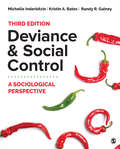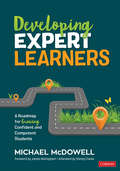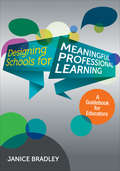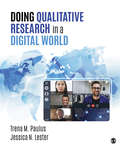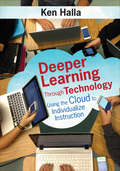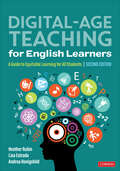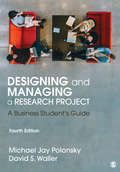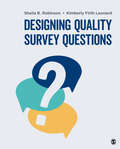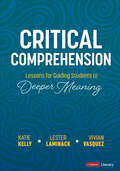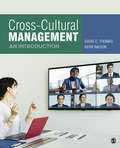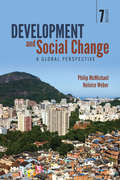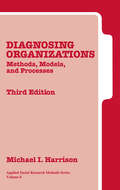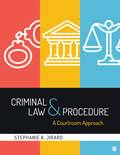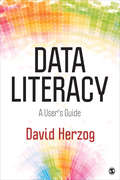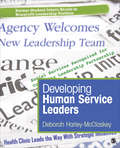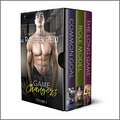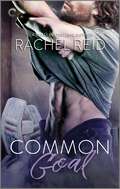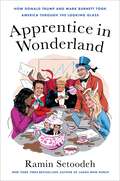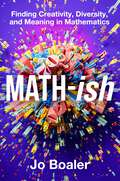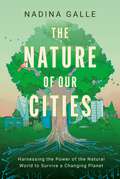- Table View
- List View
Deviance and Social Control: A Sociological Perspective
by Randy R. Gainey Michelle L. Inderbitzin Kristin A. BatesDeviance and Social Control: A Sociological Perspective provides a sociological examination of deviant behavior in society, with a significant focus on the major theories of deviance and society’s reaction to deviance. Authors Michelle Inderbitzin, Kristin A. Bates, and Randy R. Gainey use sociological theories to illuminate issues related to deviant behavior, offering clear overviews and perspectives in the field as well as introductions to classic and current research. A unique text/reader format combines substantial original chapters that clearly explain and outline the sociological perspectives on deviance with carefully selected articles from leading academic sources. Included with this title: The password-protected Instructor Resource Site (formally known as SAGE Edge) offers access to all text-specific resources, including a test bank and editable, chapter-specific PowerPoint® slides.
Developing Expert Learners: A Roadmap for Growing Confident and Competent Students (Corwin Teaching Essentials)
by Michael McDowellFinally— a roadmap for growing students’ confidence and competence in learning. We strive to empower our students to lead their own inquiry, discover knowledge, and construct approaches to solving real-life challenges. Often, though, we make the mistake of designing learning experiences that burden students with the unrealistic expectation of expertise that hasn’t yet been developed. The solution: proper scaffolding for surface, deep, and transfer learning. Building upon the groundwork from Michael McDowell’s book Rigorous PBL by Design, this new resource provides practices that strategically support students as they move from novices to experts in core academics. You’ll learn high-impact strategies that ensure students develop ownership and confidence in their learning, plus essential tools to build your own efficacy and support your colleagues in building collective expertise. Chock full of mission-critical guidance, this book Provides an actionable framework for developing student expertise Offers practical strategies, tools, and routines for creating a culture that cultivates expertise and builds student efficacy Gives a simple, effective unit and lesson template that clarifies the steps students must take to build, deepen, and apply core content knowledge and skills Ensures your students’ progress in their learning through a process for selecting instructional, feedback, and learning strategies Includes strategies for improving your professional expertise individually and collectively "As educators, we are challenged to prepare our students for college and career readiness as they go into the real world. Developing Expert Learners addresses the intentional moves of the teacher to prepare students for challenging work at their level of learning, resulting in students reaching their fullest potential as experts in their own learning." Elizabeth Alvarez, Chief of Schools Chicago Public Schools
Designing Schools for Meaningful Professional Learning: A Guidebook for Educators
by Janice T. BradleyEmpower your teachers as partners in professional learning—and see student achievement soar! Are you ready for a professional learning program that makes a lasting difference in the quality of teaching within your school or district? Janice Bradley, a highly-respected educator shows how to promote your faculty’s professional growth and accountability through job-embedded learning. This breakthrough book enables education leaders to Work collaboratively with faculty to develop and implement a five-part plan for professional learning designed to meet your school’s unique needs Connect professional learning with practices that have the greatest positive effect in the classroom Link professional development to teacher evaluation in a manner that builds trust Learn best practices from schools that implemented Bradley’s methodology, and benefit from user-friendly strategies and tools Say goodbye to top-down programming that’s quickly forgotten, and discover an approach that empowers and inspires your faculty at all levels of experience. "It′s hard to imagine a simple, five-step process that could integrate all of Learning Forward′s seven professional learning standards, yet that is exactly what Janice Bradley has done in the book, Designing Schools for Meaningful Professional Learning." —Patricia Roy, Senior Consultant Learning Forward Center for Results "I’ve never experienced professional learning such as this! Taking part in collaborative learning with my team gave me the opportunity to explore questions and curiosities about my students that have been buried in years of district-driven professional development. Now my colleagues and I research together in order to create a learning environment every child deserves." —Kathryn Million, First-Grade Dual Language Teacher Las Cruces, NM
Doing Qualitative Research in a Digital World
by Jessica Nina Lester Trena M. PaulusWhile some qualitative methods texts touch upon online communities as a potential data source, show how to conduct interviews and focus groups online, or select recording devices and analysis software, no book to date has guided readers in the creation of a comprehensive digital workflow for their research. By working through each chapter in this book, readers will be able to generate a unique digital workflow for designing and implementing their research. The book provides a deep exploration of the relationship between theories of technology, substantive theories, and methodological theory, and shows how together these inform the development of a quality research design. The authors include vignettes—narratives written by qualitative researchers describing cutting-edge use of digital tools and spaces—and also give examples of published studies, which together provide practical illustration of the content. Woven throughout is explicit attention to ethical challenges that are likely to be faced by researchers when adopting digital tools. The book invites readers to engage in a critical appraisal of the role of technology in qualitative research through reflection, conversation, and engagement with the larger community of researchers.
Deeper Learning Through Technology: Using the Cloud to Individualize Instruction
by Kenneth P. HallaUse the Cloud to Individualize Your Instruction and Watch Your Students Thrive! The advent of cloud-stored data that can be entered, changed, and accessed anywhere is a development full of potential for today’s classroom. This book is the all-in-one resource you need to be sure your students reap the fullest rewards from cloud-based developments. Teacher and top ed-blogger Ken Halla explains: Strategies for leveraging the cloud to create a self-paced, learner-centered classroom How to take advantage of tech tools to facilitate learning Real-life case studies and activities to ensure an enjoyable implementation experience. Stay ahead of the curve with Ken Halla’s strategies, which you can implement the next morning. "Halla′s book, written from practitioner experience, provides practical and simple integration techniques that will assist both novice and experienced teachers incorporate technology to enhance student learning." —Eric Sheninger, author of Digital Leadership, Changing Paradigms for Changing Times "This is a must read--a detailed nuts and bolts guide to classroom tools in the cloud." —Michael B. Horn, Co-Founder and Director, Christensen Institute Author of Disrupting Class: How Disruptive Innovation Will Change the Way the World Learns. "Whether you are an ed tech veteran or just getting started, Halla′s book will help you tailor learning to meet the needs of your students. This book will help you create the learner-focused classroom you want to build! A must-have resource for today′s teachers!" —Jaime Casap, Global Education Evangelist Google
Digital-Age Teaching for English Learners: A Guide to Equitable Learning for All Students
by Lisa M. Estrada Andrea Honigsfeld Heather RubinBridge the Digital Divide with Research-Informed Technology Models Since the first edition of this bestselling resource many schools are still striving to close the digital divide and bridge the opportunity gap for historically marginalized students, including English learners. And the need for technology-infused lessons specifically aligned for English learners is even more critically needed. Building from significant developments in education policy, research, and remote learning innovations, this newly revised edition offers unique ways to bridge the digital divide that disproportionally affects culturally and linguistically diverse learners. Designed to support equitable access to engaging and enriching digital-age education opportunities for English learners, this book includes Research-informed and evidence-based technology integration models and instructional strategies Sample lesson ideas, including learning targets for activating students’ prior knowledge while promoting engagement and collaboration Tips for fostering collaborative practices with colleagues Vignettes from educators incorporating technology in creative ways Targeted questions to facilitate discussions about English language development methodology Complete with supplementary tools and resources, this guide provides all of the methodology resources needed to bridge the digital divide and promote learning success for all students.
Designing and Managing a Research Project: A Business Student′s Guide
by Michael J. Polonsky David S. WallerDesigning and Managing a Research Project: A Business Student’s Guide is a practical, step-by-step guide that shows business students how to successfully conduct a research project, from choosing the topic to presenting the results. The authors have applied their many years of experience in supervising student projects to provide examples of actual research problems and to offer practical solutions. The inclusion of topics such as supervision, group work and ethics, and both qualitative and quantitative data analysis, along with examples from real student research provide a unique perspective. The new Fourth Edition includes broader types of student project examples, such as an Economics thesis, additional international business cases, increased coverage of Questionnaire Design and Institutional Review Boards, and an integrated case throughout the book on "High Performance Shoes" with supporting materials and data. Additional resources including case studies, PowerPoint slides, and test bank are available on the authors’ website.
Designing Quality Survey Questions
by Kimberly Firth Leonard Sheila B. RobinsonSurveys are a cornerstone of social and behavioral research, and with the use of web-based tools, surveys have become an easy and inexpensive means of gathering data. But how researchers ask a question can dramatically influence the answers they receive. Designing Quality Survey Questions shows readers how to craft high quality, precisely-worded survey questions that will elicit rich, nuanced, and ultimately useful data to help answer their research or evaluation questions. The authors address challenges such as language preferences for standard demographic questions (e.g. How to ask about gender), creative question design to keep respondents engaged and avoid survey fatigue, web-based survey formats, culturally-responsive survey design, and factors that influence survey responses (memory, social desirability, etc.). Numerous examples of questions illustrate each identified principle of question construction.
Critical Comprehension [Grades K-6]: Lessons for Guiding Students to Deeper Meaning (Corwin Literacy)
by Lester Laminack Vivian Maria Vasquez Katie KellyBecause high-level comprehension cannot be divorced from wide-ranging texts To be literate is to think through multiple perspectives, exploring diverse texts, and using the power of story to give students the life skills to discuss just about anything with critical curiosity. Critical Comprehension transforms this vital work into an accessible, three-step lesson process. Using picture books, multimodal texts, and thoughtfully framed questions, each differentiated lesson expands students’ understanding of a text through: First read: the "movie read", during which the text is read without interruption Second read: The teacher poses questions that probe deeper meanings through interaction with the text to summarize, name and highlight issues, analyze and infer, to make more informed decisions about what to believe and what to question. Third read: Harnessing students’ curiosities, the class revisits the text to talk back to theme, symbols, central idea, or social, cultural, historical influences at work on author and audience Popular media, classic novels, breaking news — the world’s content is ready for students to absorb. But are we ready to help them read it well? Equipped with this resource, the answer is, Yes, we are.
Cross-Cultural Management: An Introduction
by David C. Thomas J. H. InksonCross-Cultural Management: An Introduction offers students a hands-on approach to cross-cultural management that they can apply to a wide variety of organizational contexts. Rather than focusing on specific countries, authors David C. Thomas and Kerr Inkson highlight the interactions of people from different cultures in organizational settings to provide students with practical applications of concepts in international management. Real-world examples and case studies help students understand and integrate differences between attitudes, values, beliefs, and assumptions so that they can thrive as managers.
Direct Social Work Practice: Theories and Skills for Becoming an Evidence-Based Practitioner (Social Work in the New Century)
by Brian E. Perron Elizabeth Harbeck Voshel Mary C. RuffoloUsing a case-based approach to connect the classroom and the practice environment, this foundational text incorporates a broad set of themes that include advocacy, social justice, global focus, ethics, theory, and critical thinking. Integrated, up-to-date, evidence-based content related to diversity, social justice, and international issues helps readers develop the basic skills of engagement, assessment, intervention, and reflective practice, as well as the key skills needed for the field experience. Each chapter of the book is mapped to the latest Educational Policy and Accreditation Standards (EPAS) to aid schools of social work in connecting the course content with monitored outcomes.
Development and Social Change: A Global Perspective
by Philip McMichael Heloise WeberDevelopment and Social Change: A Global Perspective explains how development thinking and practice have shaped our world. It introduces students to four interconnected projects, and how their dynamics, contradictions and controversies have influenced development trajectories: colonialism, the development era, the neoliberal globalization project, and sustainable development. Authors Philip McMichael and Heloise Weber use case studies and examples to help describe a complex world in transition. Students are encouraged to see global development as a contested historical project. By showing how development stems from unequal power relationships between and among peoples and states, often with planet-threatening environmental outcomes, it enables readers to reflect on the possibilities for more just social, ecological and political relations.
Diagnosing Organizations: Methods, Models, and Processes (Applied Social Research Methods #8)
by Michael I. HarrisonClick ′Additional Materials′ for downloadable sample chapterMany managers and organizational leaders face shrinking budgets, growing competition, and changing organizational alliances and missions A bewildering array of new technologies and management techniques offer help in handling these challenges. To respond effectively and avoid wasting resources, decision makers need to diagnose organizational conditions, plan changes carefully, and apply appropriate technologies and management techniques. The Third Edition of the bestselling Diagnosing Organizations shows how consultants and applied researchers can help decision makers quickly and flexibly diagnose problems and challenges and decide how to deal with them. Key FeaturesModels for framing diagnostic problems, identifying underlying conditions, and providing feedback Methods for gathering and analyzing diagnostic data Processes for working on a diagnosis with clients and other members of an organizationThis thoroughly revised edition can help practitioners of diagnosis directly address concerns that are critical to clients, rather than just provide feedback on current conditions and operations. In an authoritative, yet readable fashion author Michael I. Harrison presents updated treatments of the uses of diagnosis, evaluating organizational effectiveness, improving team performance, planning organization redesign projects, and assessing organization-environment relations and competitive strategy. Also treated are the politics of change management, professional dilemmas, and ethical issues confronting practitioners. Professors of research methods across the social sciences will find Diagnosing Organizations, Third Edition an invaluable text for their courses. The second edition was widely adopted in departments of Management, Public Health, Nursing, Education, Public Administration, Psychology, Criminal Justice, and many others.
Culture Counts: A Concise Introduction to Cultural Anthropology
by Serena Nanda Richard L. WarmsNow with SAGE Publishing! Culture Counts is a concise introduction to anthropology that illustrates why culture matters in our understanding of humanity and the world around us. Serena Nanda and Richard L. Warms draw students in with engaging ethnographic stories and a conversational writing style that encourages them to interact cross-culturally, solve problems, and effect positive change. The brief format gives majors and non-majors the essentials they need and frees up the instructor to teach the course the way they want to teach it. The Fifth Edition includes new examples and vignettes that are important to the study of cultural anthropology. Issues of gender, identity, globalization, intersectionality, inequality, and public health have been incorporated throughout the book, as well as a new chapter on race and ethnicity that brings the book in step with recent conversations about power, race, and history. This title is accompanied by a complete teaching and learning package.
Criminal Law and Procedure: A Courtroom Approach
by Stephanie A. JirardWritten by a former federal prosecutor and public defender, Criminal Law and Procedure: A Courtroom Approach introduces students to the essentials of criminal law and procedure by illuminating the legal issues justice professionals face before, during, and after a criminal trial. Through the examination of statutes, edited case excerpts, and recent constitutional interpretation of black letter law, the text bridges the gap between learning criminal procedure and applying criminal law. Drawing from author Stephanie A. Jirard’s vast experience in both the courtroom and the classroom, Criminal Law and Procedure gets students to think critically about real-world issues and practice applying the law in a just and meaningful way. Accessible and engaging, this text presents criminal law and procedure as an exciting opportunity to have a direct, positive impact on our communities and the criminal justice system. Key Features: "Making the Courtroom Connection" boxes help students apply the legal concepts they learn to real-life issues facing law enforcement, the court system, and correctional institutions today. Edited case excerpts connect criminal law and procedure with current case material on relevant topics so students can see the impact of judicial decision making. "Applying the Law to the Facts" boxes engage students’ critical thinking skills and enhance their logical problem-solving abilities by providing opportunities to apply the rule of law to different scenarios. "Springboard for Discussion" prompts spark conversations and invite students to contrast the moral, ethical, and legal implications of criminal law and procedure in a larger context. Problem-solving exercises at the end of each chapter provide students with opportunities to test themselves on the material before a formal assessment. Active Learning Exercises in the Instructor’s Manual enable professors to offer additional opportunities for experiential learning. Give your students the SAGE edge! SAGE edge offers a robust online environment featuring an impressive array of free tools and resources for review, study, and further exploration, keeping both instructors and students on the cutting edge of teaching and learning.
Data Literacy: A User′s Guide
by David L. HerzogA practical, skill-based introduction to data analysis and literacy We are swimming in a world of data, and this handy guide will keep you afloat while you learn to make sense of it all. In Data Literacy: A User′s Guide, David Herzog, a journalist with a decade of experience using data analysis to transform information into captivating storytelling, introduces students and professionals to the fundamentals of data literacy, a key skill in today’s world. Assuming the reader has no advanced knowledge of data analysis or statistics, this book shows how to create insight from publicly-available data through exercises using simple Excel functions. Extensively illustrated, step-by-step instructions within a concise, yet comprehensive, reference will help readers identify, obtain, evaluate, clean, analyze and visualize data. A concluding chapter introduces more sophisticated data analysis methods and tools including database managers such as Microsoft Access and MySQL and standalone statistical programs such as SPSS, SAS and R.
Developing Human Service Leaders
by Deborah Harley-McClaskeyThis empowering text for human services students covers the skills and behaviors essential for leaders to manage themselves, their teams, and the organization. Using a unique coaching voice, the book follows a Reflection–Diagnosis–Prescription approach for leadership development with exercises built into the dialogue. The final chapter, Prognosis, offers a workbook-style exercise to help students make a personal change.
Game Changers Volume 2: A Spicy Hockey Romance Collection (Game Changers)
by Rachel ReidCommon GoalVeteran goaltender Eric Bennett has faced down some of the toughest shooters on the ice, but nothing prepared him for his latest challenge—life after hockey. It&’s time to make some big changes, starting with finally dating men for the first time.Graduate student Kyle Swift moved to New York nursing a broken heart. He&’d sworn to find someone his own age to crush on (for once). Until he meets a gorgeous, distinguished silver fox hockey player. Despite their intense physical attraction, Kyle has no intention of getting emotionally involved. He&’ll teach Eric a few tricks, have some mutually consensual fun, then walk away.Eric is more than happy to learn anything Kyle brings to the table. And Kyle never expected their friends-with-benefits arrangement to leave him wanting more. Happily-ever-after might be staring them in the face, but it won&’t happen if they&’re too stubborn to come clean about their feelings.Everything they both want is within reach… They just have to be brave enough to grab it.Role ModelThe hits just keep coming for Troy Barrett. Traded to the worst team in the league would be bad enough, but coming on the heels of a messy breakup and a recent scandal… Troy just wants to play hockey and be left alone. He doesn&’t want to be in the news anymore, and he definitely doesn&’t want to &“work on his online presence&” with the team&’s peppy social media manager.Harris Drover can tell standoffish Troy isn&’t happy about the trade—anyone could tell, frankly, as he doesn&’t exactly hide it well—but Harris doesn&’t give up on people easily. Even when he&’s developing a crush he&’s sure is one-sided. And when he sees Troy&’s smile finally crack through his grumpy exterior, well… That&’s a man Harris couldn&’t turn his back on if he wanted to.Suddenly, Troy&’s move to the new team feels like an opportunity—for Troy to embrace his true self, and for both men to surrender to their growing attraction. But indulging in each other behind closed doors is one thing, and for Troy, being in a public relationship with Harris will mean facing off with his fears, once and for all.The Long GameShane Hollander and Ilya Rozanov have been seeing each other for ten years and have kept it secret. From friends, from family…from the league. If Shane wants to stay at the top of his game, what he and Ilya share has to remain secret. He loves Ilya, but what if going public ruins everything?Ilya is sick of secrets. Shane has gotten so good at hiding his feelings, sometimes Ilya questions if they even exist. The closeness, the intimacy, even the risk that would come with being open about their relationship…Ilya wants it all.It&’s time for them to make the call and decide what&’s most important—hockey or love.Originally Published in 2020
Common Goal: A Gay Sports Romance (Game Changers #4)
by Rachel Reid&“Rachel Reid&’s hockey heroes are sexy, hot, and passionate! I&’ve devoured this entire series and I love the flirting, the exploration and the delicious discovery in Common Goal!&” —Lauren Blakely, #1 New York Times bestselling author of A Guy Walks into My Bar New York Admirals goalie Eric never thought his friends-with-benefits arrangement with much-younger Kyle would leave them both wanting more…Veteran goaltender Eric Bennett has faced down some of the toughest shooters on the ice, but nothing prepared him for his latest challenge—life after hockey. It&’s time to make some big changes, starting with finally dating men for the first time.Graduate student Kyle Swift moved to New York nursing a broken heart. He&’d sworn to find someone his own age to crush on (for once). Until he meets a gorgeous, distinguished silver fox hockey player. Despite their intense physical attraction, Kyle has no intention of getting emotionally involved. He&’ll teach Eric a few tricks, have some mutually consensual fun, then walk away.Eric is more than happy to learn anything Kyle brings to the table. And Kyle never expected their friends-with-benefits arrangement to leave him wanting more. Happily-ever-after might be staring them in the face, but it won&’t happen if they&’re too stubborn to come clean about their feelings.Everything they both want is within reach… They just have to be brave enough to grab it.USA TODAY bestselling author Rachel ReidGame ChangersBook 1: Game ChangerBook 2: Heated RivalryBook 3: Tough GuyBook 4: Common GoalBook 5: Role ModelBook 6: The Long Game
Biocivilisations: A New Look at the Science of Life
by Predrag B. Slijepčević*2024 Nautilus Book Award Gold Medal Winner: Restorative Earth Practices "A brilliant book [that] shows a way out of the destructive trap of Anthropocentric arrogance."—Vandana Shiva, author of Terra Viva "An unusually thought-provoking and ambitious book."—Dr. James A. Shapiro, author of Evolution: A View from the 21st Century Biocivilisations is an important, original rethinking of the mystery of life and its deep uncertainty, exploring the complex civilisations that existed on Earth long before humans. What is life? Many scientists believe life can be reduced to ‘mechanistic’ factors, such as genes and information codes. Yet there is a growing army of scientists, philosophers and artists who reject this view. The gene metaphor is not only too simplistic but deeply misleading. If there is a way to reduce life to a single principle, that principle must acknowledge the creativity of life, turning genetic determinism on its head. The term biocivilisations is the acknowledgement of this uncertainty of life, as opposed to a quasi-certainty of the human position governed by a narrow time window of the scientific revolution. Life existed without humans for more than 99.99 percent of the Earth’s existence. Life will also continue without humans long after our inevitable extinction. In Biocivilisations, Dr Predrag Slijepčević shows how bacteria, amoebas, plants, insects, birds, whales, elephants and countless other species not only preceded human beings but demonstrate elements of how we celebrate human civilisation – complex communication, agriculture, science, art, medicine and more. Humans must try to adopt this wisdom from other biocivilisations that have long preceded our own. By rethinking the current scientific paradigm, Dr Slijepčević makes clear that a transformation – from a naïve young species into a more mature species in tune with its surroundings – will save us from our own violence and the violence we inflict on the rest of our living planet. "Read this book if you would like to understand the intelligence of living systems."—Dr Denis Noble, University of Oxford
Love, Nature, Magic: Shamanic Journeys into the Heart of My Garden
by Maria Rodale*2024 Nautilus Book Award Gold Medal Winner: Nature & Animals *A Wall Street Journal "Best Read for Spring" "Anyone interested in plant intelligence, and in journeying WITHOUT plant medicines, will want to read this new book."—Michael Pollan, author of This is Your Mind on Plants (via Twitter) "Maria Rodale has written a book for anyone and everyone who loves nature, the garden, and the planet. The book we didn't know we needed, at the time we needed it most. For comfort, for solace, for the heart and the mind."—Bette Midler (via Twitter) Join bestselling author, activist, and garden expert Maria Rodale on her shamanic journeys as she reflects on her surprising conversations with the spirits of the familiar plants and animals around us—and the knowledge they share with us. In Love, Nature, Magic, organic advocate and former CEO of a global health and wellness company Maria Rodale combines her love of nature and gardening with her experience in shamanic journeying, embarking on an epic adventure to learn from plants, animals, and insects—including some of the most misunderstood beings in nature. Maria asks them their purpose and listens as they show and declare what they want us humans to know. From Thistles to Snakes, Poison Ivy to Mosquitoes, these nature beings convey messages that are relevant to every human, showing us how to live in balance and harmony on this Earth. Through journeys filled with surprises, humor, and foibles, follow Maria’s evolution from being annoyed with to accepting—and even falling in love with—our most difficult neighbors (including human ones). Along the way, she tells her own story of how she learned about shamanic journeying and its near-universal manifestation in traditional cultures worldwide. She describes what her experiences of shamanic journeying are like—simply, honestly, and with a touch of irreverence. Maria’s journeys include conversations with: Mugwort • Vulture • Bat • Rabbit • Lanternfly • Lightning Bug • Osage Orange • Deer • Paper Wasp • Dandelion • Tick • Groundhog • Milkweed • And more! Throughout, Rodale shares an essential truth that resonates across her shamanic explorations: We first must heal our own hearts, for only then can we truly love others and begin to heal planet Earth. "Love, Nature, Magic will blow your mind and open your heart."—John Grogan, author of Marley & Me "Let’s hear it for women intent on conquering new worlds—especially on the astral plane. If we’re going to get trippy, I can think of no better guide than Maria Rodale . . . [This] is a fascinating book . . . Rodale bares her soul. Part of the charm of her writing is its unfiltered and enthusiastic forthrightness; no reportorial distancing or irony here. This is a journey into her heart."—Dominique Browning, Wall Street Journal
Apprentice in Wonderland: How Donald Trump and Mark Burnett Took America Through the Looking Glass
by Ramin SetoodehFrom the editor in chief of Variety and author of the New York Times bestseller Ladies Who Punch, the never-fully-told, behind-the-scenes story of Donald Trump and The Apprentice, the long-running reality series that catapulted him to the White House.Here for the first time is the definitive untold story of Donald Trump’s years as a reality TV star. Trump himself admits he might not have been president without The Apprentice. Now, just as he uncovered the chaos inside the daytime favorite The View in his bestselling Ladies Who Punch, Ramin Setoodeh chronicles Trump’s dramatic tenure as New York’s ultimate boss in the boardroom, a mirage created by Survivor producer Mark Burnett and NBC boss Jeff Zucker. With unprecedented access, including hours of interviews with Trump, his boardroom advisers George Ross and Carolyn Kepcher, Eric Trump, and some of the most memorable contestants, and writing with flair and authority, Setoodeh shares all the untold tales from this legendary show that has left its mark on popular culture, shaped the legend of its star, and ultimately changed American history.
The Midnight Feast: A Novel
by Lucy FoleySecrets. Lies. Murder. Let the festivities begin..."An irresistible whodunit with an irresistible Blair Witch-meets-Fyre Festival backdrop." -- People"Sharp, stylish and stunning...Foley's best yet." -- Chris Whitaker, New York Times bestselling author of We Begin at the End"Agatha Christie for the Instagram age." -- GuardianThe deliciously twisty new locked room murder mystery from the #1 New York Times bestselling author of The Guest List and The Paris ApartmentIt’s the opening night of The Manor, and no expense, small or large, has been spared. The infinity pool sparkles; crystal pouches for guests’ healing have been placed in the Seaside Cottages and Woodland Hutches; the “Manor Mule” cocktail (grapefruit, ginger, vodka, and a dash of CBD oil) is being poured with a heavy hand. Everyone is wearing linen.But under the burning midsummer sun, darkness stirs. Old friends and enemies circulate among the guests. Just outside the Manor’s immaculately kept grounds, an ancient forest bristles with secrets. And the Sunday morning of opening weekend, the local police are called. Something’s not right with the guests. There’s been a fire. A body’s been discovered.THE FOUNDER * THE HUSBAND * THE MYSTERY GUEST * THE KITCHEN HELPIt all began with a secret, fifteen years ago. Now the past has crashed the party. And it’ll end in murder at…The Midnight Feast.
Math-ish: Finding Creativity, Diversity, and Meaning in Mathematics
by Jo BoalerFrom Stanford professor, author of Limitless Mind, youcubed.org founder, and leading expert in the field of mathematics education Jo Boaler comes a groundbreaking guide to finding joy and understanding by adopting a diverse approach to learning math.“Every once in a while, someone revolutionizes an approach to a difficult subject and changes it forever. That is what Jo Boaler has done for math. Fresh, smart, and inclusive, Jo Boaler's strategy eschews the one-size-fits-a-few approach and instead allows math to be seen and solved by everyone. A huge achievement. Math-ish is the only math book I’ve ever enjoyed reading in my entire life. Honestly.” -Bonnie Garmus, author of Lessons in ChemistryMathematics is a fundamental part of life, yet every one of us has a unique relationship with learning and understanding the subject. Working with numbers may inspire confidence in our abilities or provoke anxiety and trepidation. Stanford researcher, mathematics education professor, and the leading expert on math learning Dr. Jo Boaler argues that our differences are the key to unlocking our greatest mathematics potential.In Math-ish, Boaler shares new neuroscientific research on how embracing the concept of “math-ish”—a theory of mathematics as it exists in the real world—changes the way we think about mathematics, data, and ourselves. When we can see the value of diversity among people and multi-faceted approaches to learning math, we are free to truly flourish. Utilizing the latest research on math education, Jo guides us through seven principles that can radically reframe our relationship with the subject:• The power of mindset on learning• Utilizing a visual approach to math• The impact of physical movement and communication on understanding• Understanding the value of an "ish" perspective - in mathematics and beyond• The importance of connected and flexible knowledge• New data on diverse teaching modes that work with different learning styles, not against them• The value of diversity in learning mathematics—and beyondWhen mathematics is approached more broadly, inclusively, and with a greater sense of wonder and play—when we value the different ways people see, approach, and understand it—we empower ourselves and gain a beneficial understanding of its value in our lives.
The Nature of Our Cities: Harnessing the Power of the Natural World to Survive a Changing Planet
by Nadina GalleIn the tradition of Elizabeth Kolbert and Michael Pollan, The Nature of Our Cities is a stirring exploration of how innovators from around the world are combining urban nature with emerging technologies, protecting the planet’s cities from the effects of climate change and safeguarding the health of their inhabitants.We live in an age when humanity spends 90% of its time indoors, yet the nature around us—especially in America’s cities—has never been more vital. This distancing from nature has sparked crises in mental health, longevity, and hope for the next generation, while also heightening the risks we face from historic floods, heatwaves, and wildfires. Indeed, embracing nature holds untapped potential to strengthen and fortify our cities, suburbs, and towns, providing solutions spanning flood preparation, wildfire management, and promoting longevity. As ecological engineer Dr. Nadina Galle shows in The Nature of Our Cities nature is our most critical infrastructure for tackling the climate crisis. It just needs a little help. A fellow at MIT’s Senseable City Lab and selected for Forbes’ 30 under 30 list, Galle is at the forefront of the growing movement to fuse nature and technology for urban resilience. In THE NATURE OF OUR CITIES, she embarks on a journey as fascinating as it is pressing, showing how scientists and citizens from around the world are harnessing emerging technologies to unlock the power of the natural world to save their cities, a phenomenon she calls the “Internet of Nature.” Traveling the globe, Galle examines how urban nature, long an afterthought for many, actually points the way toward a more sustainable future. She reveals how technology can help nature navigate this precarious moment with modern advances such as:Laser-mapping that identifies at-risk neighborhoods to fight deadly health disparitiesA.I.-powered robots that prevent wildfires from reaching urban areasIntelligent water gardens that protect cities from floods and hurricanesAdvanced sensors that achieve 99% tree survival in dry, hot summers Optimistic in spirit yet pragmatic in approach, Galle writes persuasively that the future of urban life depends on balancing the natural world with the technology that can help sustain it. By turns clear-eyed and lyrical, THE NATURE OF OUR CITIES marks the emergence of an invigorating, prescient new talent in nature writing.
